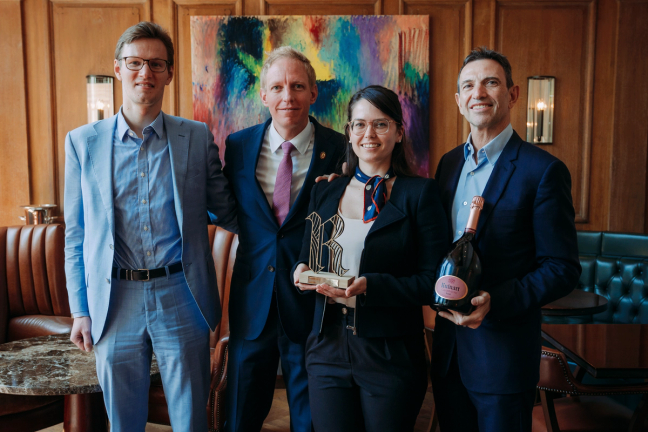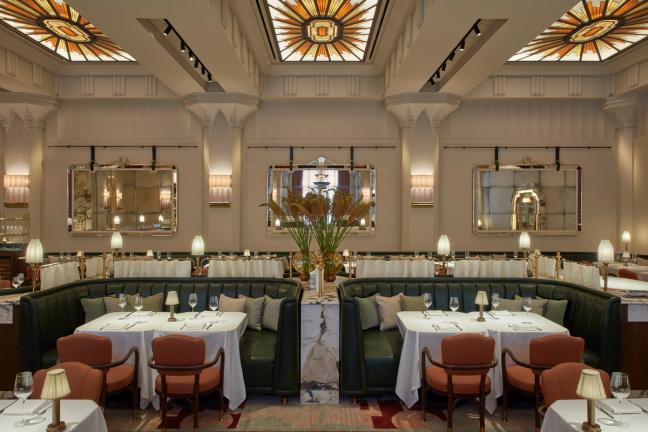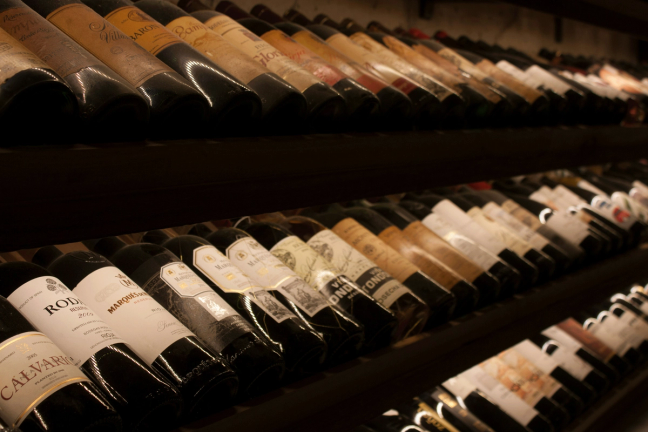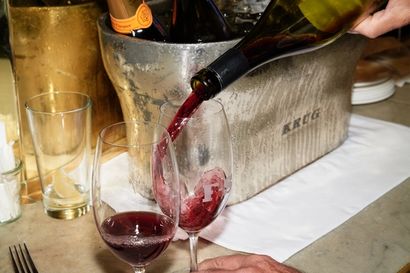How to talk to a sommelier
The first step in navigating this minefield, according to one expert, is to relax and be honest; ‘There’s nothing wrong with not knowing about wine’
We’ve all been there. You’re on a date in a high-toned restaurant, all is going swimmingly, and then you become aware of the imminent, imposing presence of the sommelier, who, for some reason, is wearing a silver cup on a chain around his neck, as he presents you with a weighty tome, full of names of which you’ve never heard, and, sensing your discomfort, finally leans in to ask, in the most patronising manner possible: “Perhaps I can be of assistance, sir?”
If you’re not someone who knows his claret from his Beaujolais, as a charming man once sang, such a scenario can be a little testing, to say the least. Where to even start? But fear not. First, for the most part, gone are the days of overbearing sommeliers decked out in ridiculous regalia. Now, it’s all hip, young somms – of who, thankfully, an ever-increasing number are women. And, what would you know, most within this new generation are adept at putting guests at ease, and actually want to help people find a wine that they will enjoy.

Image: Getty
So, how best to engage with these clever types to get the most out of them, find a delicious wine, and – crucially – not make a fool of yourself?
First, relax. This is not a test. And like dropping your car off for its MOT and trying to pretend you know what might be behind an issue with the brake pads, any bravado will soon be seen through – and then who looks stupid? The key, says Emma Denney, head sommelier at Claridge’s hotel, is simply to be honest.

Emma Denney, head sommelier at Claridge’s hotel
‘So many guests come out with things they’ve heard elsewhere, about wines that they think they should like,’ says Denney, who was recently crowned winner of the 2024 Ruinart Sommelier Challenge, awarded for blind-tasting prowess.
‘But they don’t actually know what they mean, which then makes things difficult when we ask a follow up question. There’s a bit of fear involved when it comes to wine, whereby people feel they should know something. But wine is a massive topic and I studied hard for years to learn about it. There’s nothing wrong with not knowing.’
Much better, she says, is to keep things simple. ‘Tell me the kind of flavours you like, the texture you like and how much you want to spend. I can do the rest.’

The new restaurant space at Claridge's hotel
Texture is an intriguing but increasingly integral element, and is particularly important when pairing wines with food. ‘It’s a big part of a wine,’ says Denney. ‘Some reds are heavy, grippy and dry, while others are smoother, more velvety. It’s the same with whites – you can get oily wines that coat the palate and fresh, tangy wines with a bit of bite.’ The type of dish you order has a major impact here – grippier wines stand up well to rich, meaty dishes, for example, but could overpower a pea risotto.
And there’s another tip – tell the sommelier what you’re planning to eat, and ask them for recommendations that will complement your dish accordingly. Remember, most somms want to engage with and help their guests, thereby showing off their knowledge. And they know that list, however large, better than anyone.

At London’s 67 Pall Mall, the wine-themed members’ club that hosted the final of the Ruinart Sommelier Challenge, the list extends to an astonishing 5,000 wines. It is the job of Federico Moccia, the club’s head sommelier, to know them all. And, he says, he quite likes being put to the test.
‘I enjoy trying to solve the puzzle by finding a wine the guest will enjoy.’ But he needs some insight first. ‘The most useful thing a guest can tell me is a grape variety that they like. Sauvignon blanc, for example. And then, ideally, they might know a region whose sauvignons they like. New Zealand, perhaps. Then I know exactly the kind of wines they enjoy, and I can explore around that fresh, aromatic, zesty style and maybe lead them towards something similar that they haven’t tried before, like an albariño.’
Again, though, don’t try to fake it. ‘If someone isn’t sure of the style of different regions, we can explore different options – do you like the rich, creamy, textured style of sauvignon? Great, let’s try the Loire Valley. Do you like the lean, citric, grassy style? Okay, back to New Zealand.’
The list at 67 Pall Mall is peppered with both rarefied cuvées from classic names and more recherché stuff from esoteric regions. Wines from less popular spots, from Hungary to Uruguay, can certainly be worth asking about, since more often than not, they’re a personal choice of the sommelier, there for variety rather than to tick a box, and hence they often offer the best value, since guests need some encouragement to go outside their comfort zone. Every list, on the other hand, seems to have a Chablis and a Sancerre on it, neither of which are renowned for offering great value.

Federico Moccia, head sommelier at 67 Pall Mall
One last thing – with more and more restaurants serving wine by the glass, particularly through the Coravin system (which allows access to the wine without popping the cork), it can be worth asking a sommelier to try a wine first. Just don’t take advantage. ‘Asking for two wines to compare, to then choose one, is fine,’ Moccia says. ‘Asking for a whole flight of wines to assess is taking the mickey.’ (On which note: when a sommelier offers you the wine you have selected to try, they’re not doing so for you to check that you like it – they’re doing so for you to ensure it is not faulty in any way, be it oxidised [subject to air ingress, and thus flat and lacking vitality] or corked [infected by cork taint, and smelling of wet cardboard]. If in doubt, just ask the sommelier what they think.)
Denney’s pet peeve, meanwhile, is ‘People who listen to your advice, and then just go on their phone and look up wines on Vivino [an app that rates wines based on peer reviews]. I always feel rather offended – I know every wine on the list, so ask me about them!’
Turns out that sommeliers are actually real people, with human empathy and feelings, even. Use them while you can, before the AI somms take over…
Want more drinks content? We explore the art of extreme winemaking…

Become a Gentleman’s Journal Member?
Like the Gentleman’s Journal? Why not join the Clubhouse, a special kind of private club where members receive offers and experiences from hand-picked, premium brands. You will also receive invites to exclusive events, the quarterly print magazine delivered directly to your door and your own membership card.


